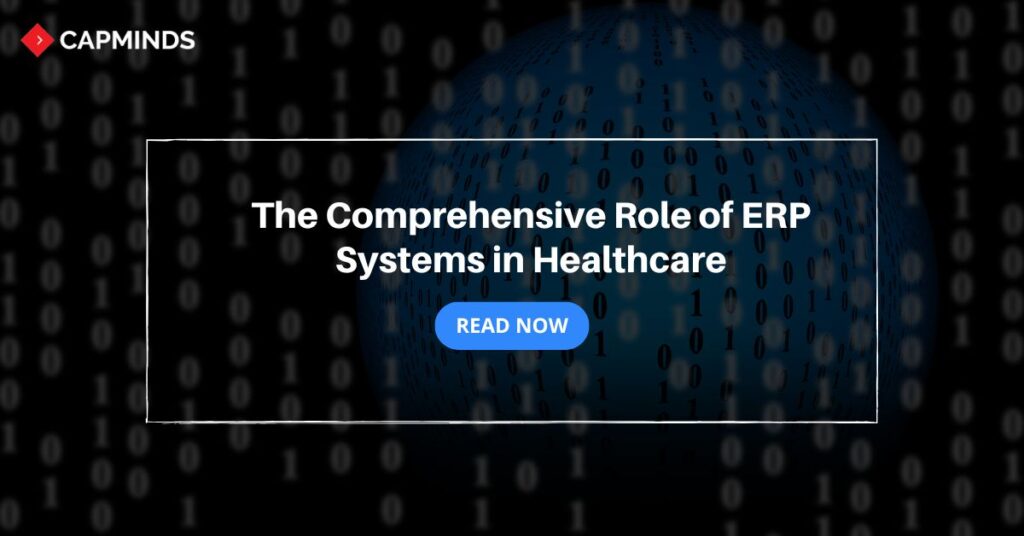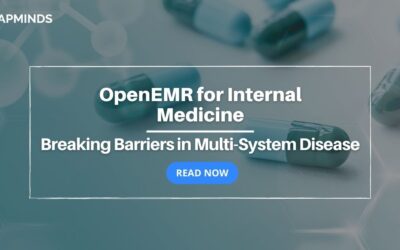The Comprehensive Role of ERP Systems in Healthcare
One of the most important tools that drives changes in the healthcare domain is the Enterprise Resource Planning System (ERP). ERP systems help healthcare organizations manage their processes, store data securely, and cut costs.
According to Stats, the ERP market is expected to grow beyond $100 billion by 2025, it’s clear that more healthcare providers are embracing it. If you want to make your healthcare organization more efficient, ERP could be your solution.
In this blog post, you’ll learn the role of ERP systems in healthcare, the types of ERP systems, key features, and the benefits they offer for healthcare organizations.
What is Healthcare ERP Systems?
Enterprise Resource Planning System is a software solution. It is mainly designed to integrate various processes within the healthcare organization.
Before this, healthcare organizations used multiple platforms to manage various aspects of healthcare operations. Because of fragmented systems, healthcare staff members and providers face significant challenges such as:
- Lack of communication between team members
- Increased complexity in managing multiple systems
- Higher operational costs
- Inefficiency in workflow
This is where the ERP system comes in.
It unifies various components under one comprehensive solution. It ensures seamless integration across patient care, clinical operations, and back-office functions like administration, staffing, and finance.
Utilizing an ERP system provides caregivers have uninterrupted access to critical data, improves cost tracking, enhances resource management, and supports more efficient decision-making
The Role of ERP Systems in Healthcare
EHR systems play a very crucial role in healthcare.
Because it is the one that helps to manage core processes in healthcare organizations such as HR, Finances, and Inventory. They enable organizations to meet two primary objectives:
- Deliver quality care to patients.
- Reduce the cost of care delivery.
Most healthcare institutes upgrade their ERP systems because of this reason – Making patient care more accessible. ERP systems cover each area of healthcare which include:
- Patient Management
- Hospital Ward Management
- Nursing Management
- Human Resources
- Inventory Management
- Finance Management
The ERP systems thus help healthcare institutions achieve much better productivity and enhanced clinical outcomes by eliminating errors, improving the alignment of data, and providing real-time insights into patient needs and operations.
ERP system helps businesses with real-time patient demands, data, and test reports that guarantee the best results, which are other benefits.
Furthermore, the main advantage of ERP for healthcare is the simplification of numerous diagnostic systems, electronic medical records, and patient communication systems.
Types of ERP Systems You Need to Know
There are three types of ERP systems: On-premises ERP, Cloud ERP, and Hybrid ERP. Each type of ERP suits based on factors like size, needs, budget, and others of the organization.
On-Premises ERP
On-premises means the healthcare organization owns the server within the organization to host the ERP system. It requires huge upfront costs, infrastructural needs, IT personnel, and ongoing maintenance.
Moreover, on-premises ERP systems offer greater control and customization options. This type of ERP system is ideal for large healthcare organizations.
Cloud ERP
Cloud system means the ERP is hosted on a remote server and then accessed using an internet connection.
These types of ERP systems are often highly scalable, have low initial investment, and are easy to maintain. This is the affordable option among others which makes them the ideal choice for small healthcare organizations.
Hybrid ERP
The hybrid ERP system combines both on-premises and Cloud services and provides flexibility for mid-sized or developing healthcare institutions.
This type of ERP system carries benefits from both types of ERP systems for instance, it offers flexibility from the Cloud and better local control and customization from the on-premises.
Key Features of Healthcare ERP System
Healthcare ERP systems are often built to make everything easier for healthcare providers. It helps to streamline and enhance each aspect of operations efficiency in healthcare. These ERP systems mainly unify various platforms into one centralized platform.
Here are some of the key features and functionalities of ERP systems:
- Integration Capabilities: Enables health interoperability by integrating a different healthcare system and device. It will make smooth data transfer through APIs and secure data connections.
- Patient Management: Handles and centralizes patient records, appointment scheduling, and communication between patients and healthcare staff.
- Data Analytics and Reporting: The advanced analytics tools found in the ERP systems track KPIs and develop insightful reports.
- Financial Management: This also simplifies financial management since it automates the processes of billing, revenue cycles, and financial reporting.
- Clinical Management: The ERP solution helps manage clinical orders and coordinate patient care while providing decision-support tools to assist in clinical decision-making.
- Administrative and Operational Support: ERP systems support general activities such as document management, employee scheduling, and resource management.
- Supply Chain Management: The objective is to utilize ERP to optimize inventory, procurement, and logistics that ensure punctuality, reduce wastages and result in overall good supply chain efficiency.
- Human Resources: ERP systems include the core HR functionalities, which include payroll, training, and compliance checks.
Benefits of ERP System in Healthcare
Utilizing ERP systems benefits healthcare organizations in so many ways, for instance, it allows easy access to health records, eliminates errors and cuts down operational costs, personalized integration for organizations, and ensures enhancing industry compliance.
Gain Easy Access to Health Records
Managing multiple systems simultaneously can be a headache for providers and staff members. Implementing ERP systems means reducing this burnout.
ERP systems address accessibility issues by providing automated solutions for managing critical health records, ensuring data is available at the click of a button. This feature enhances patient care and streamlines decision-making processes for healthcare professionals.
Eliminating Errors and Cut Down Operational Costs
Financial management is one of the crucial aspects of healthcare practice. Though it is complex to manage, ERP systems do it with ease.
With advanced financial management modules, ERP systems help track income, expenses, and assets. AI-driven analytics ensure accurate operations and automation reduces human errors. This way, the operational cost will be cut down in half.
Personalized Integration for Organization
ERP solutions ensure the unification of multiple healthcare systems such as EHR, Medical Billing Systems, Scheduling systems, e-prescription systems, and devices.
Ensures offering centralized data management to make it easier to access patient data. This reduces the complexity and costs of maintaining separate systems and makes information readily accessible.
Enhanced Industry Compliance
ERP systems ensure healthcare operations comply with industry regulations by:
- Maintaining secure
- Transparent
- Traceable processes.
These systems simplify audits and documentation. By enhancing industry compliance, ERP systems help healthcare organizations to meet compliance standards easily.
CapMinds ERP Solution for Healthcare Practices
Transform your healthcare operations with a cutting-edge ERP system designed to address your organization’s unique needs. Whether you’re looking to streamline patient care, optimize financial management, or enhance compliance, CapMinds ERP solutions are here to revolutionize your practice.
💡 Why Choose CapMinds?
✔️ Tailored solutions for healthcare providers of all sizes.
✔️ Seamless integration across clinical, administrative, and operational functions.
✔️ Cloud, on-premises, and hybrid ERP options to suit your specific requirements.
✔️ Real-time data insights for informed decision-making.
✔️ Affordable, scalable, and designed to drive efficiency.




